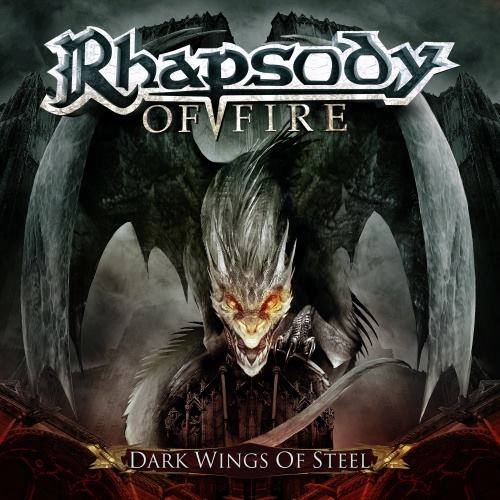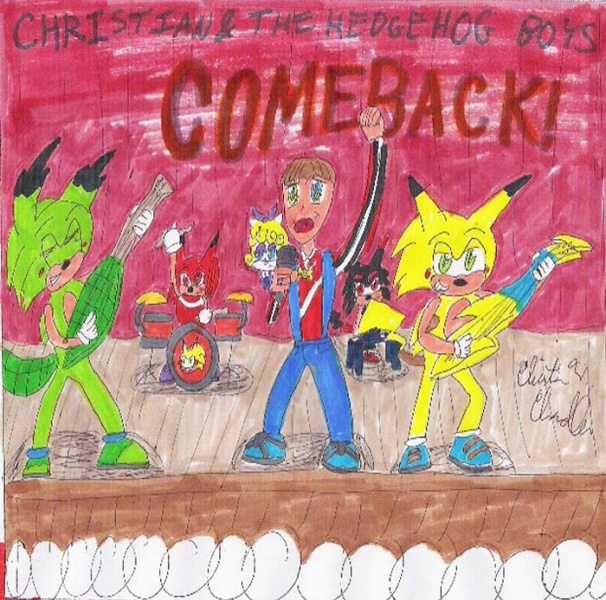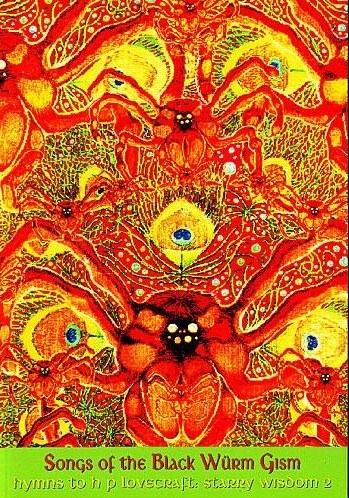 Rhapsody of Fire recorded together for nearly twenty years, and seemed like they’d last forever. But, as Hewlett-Packard Lovecraft said, even death may die. The band schismed in 2011, with guitarist Luca Turilli and keyboardist Alex Starapoli forming separate versions of Rhapsody. Dark Wings of Steel is the first Luca-less album. Call it a “friendly split”, whatever. We all know there’s a shocking story involving a haddock, a pressurized pump, and the bassist’s mother in there somewhere.
Rhapsody of Fire recorded together for nearly twenty years, and seemed like they’d last forever. But, as Hewlett-Packard Lovecraft said, even death may die. The band schismed in 2011, with guitarist Luca Turilli and keyboardist Alex Starapoli forming separate versions of Rhapsody. Dark Wings of Steel is the first Luca-less album. Call it a “friendly split”, whatever. We all know there’s a shocking story involving a haddock, a pressurized pump, and the bassist’s mother in there somewhere.
Looks like Nuclear Blast made the right call by going with Turilli’s Rhapsody, because this album is chintzy, cheap-sounding, and unworthy of the Rhapsody of Fire name. The band literally comes up short of Triumph and Agony (rightly regarded as their worst album up to this point). Where to begin? It’s Situation Abnormal, All Fucked Up.
The production is not dense and layered, as in past albums. The symphonics aren’t “real orchestra” so much as “real VST samples on Starapoli’s computer.” Dark Wings has a fake, synthetic quality that I dislike immensely. And what’s with the crappy brutal guitar tone? Rhapsody was never famous for its guitar sound, but at least Turilli’s tone fit with the massive orchestral and symphonic backdrops. New guitarist Roby De Micheli has a dry, midscooped sound reminiscent of a Crate practice amp – annoying and inappropriate. Add in weak-as-fvck drumming that couldn’t knock the froth off a double-latte, and you have the new Rhapsody – an album that’s sure to have elderly neighbours banging on your door, demanding that you turn it up to help facilitate their afternoon nap.
Two good songs – that’s it. Not three, four, or five. Two. The first is “A Tale of Magic”, which has an excellent chorus. The second is “Dark Wings of Steel”, with fast zigzagging rhythms and interesting contrapuntal ideas.
The other songs are like quarantined hospital patients dying of various diseases. Some are poorly written and forgettable, with no catchy parts or good hooks. Others try far too hard to be Rhapsody and provoke laughter – “Silver Lake of Tears” is particularly horrible. Rhapsody’s music is almost parodic already, taking the joke any further is crass. Fabio Leone’s vocals are still powerful, but he’s an overrated singer and he’s really exposed in this new stripped-back format. The shitbox production kills any atmopshere.
Last year Luca Turilli’s Rhapsody released Ascending to Infinity, which got right everything this new Rhapsodomy album gets wrong. It has lush, organic production, great songs, excellent playing, and a cohesive musical style. Ascending didn’t quite match Rhapsody’s best work, but it utterly embarasses Starapoli on this new release.
Are you a fan? Go listen to whatever Luca Turilli is working on, because HE is Rhapsody of Fire. Everyone else was dead weight, and this album proves it.
The good news: Megadeth and Black Sabbath both have new albums out, so this isn’t quite the disappointment of the year
No Comments »
 In 2006, Chris and his virtual band of hedgehogs set the world on fire. Now, they’re ready to do it all again – and no troll, no jerk, no pair of DIRTY, CRAPPED BRIEFS will get in their way.
In 2006, Chris and his virtual band of hedgehogs set the world on fire. Now, they’re ready to do it all again – and no troll, no jerk, no pair of DIRTY, CRAPPED BRIEFS will get in their way.
While the first album had Chris singing karaoke-style over Britney Spears and Backstreet Boys songs, Chris’s tastes have broadened (like his physique) and now includes artists like Madonna, Meatloaf, and Bruce Springsteen. “Trollsta’s Paradise”, is sung over “Gangsta’s Paradise” by Coolio, and is a blistering attack on the trolls and 4channers who have made his life a misery. Chris might hate black people, but that doesn’t mean he can’t appreciate gangsta rap, just as hating gay people has never stopped him from putting objects up his ass on occasion. You have to be open-minded about some things.
The next song is a remake of “Like a Virgin”, a topic Chris can speak on with some authority. Chris’s dulcet tones are hard to hear on this one, Madonna’s voice is about twice as loud as his mic volume. There’s one song that has Chris singing without any musical accompaniment – a creepy cover of Minnie Riperton’s “Loving You” where he sounds like Herbert from Family Guy. Doesn’t Herbert have a crush on a character called Chris? There you go, then.
This album comes from the period when he was dating a girl troll called Ivy, and his new amorata finds her way into many of the modified lyrics. “I’m Sexy For My Ivy” is sung over Justin Timberlake’s “Sexyback”, which was a hit song merely three years prior to this “album” being made – remarkably early to the party by Chris’s standards. He has some trouble remembering his own lyrics and staying on the beat. I blame young love.
Ivy apparently owns a pair of hermit crabs called Crass and Champ, and Chris really took a liking to them. Meatloaf’s “Paradise by the Dashboard Light” gets redone into a song about the crabs making love at the beach. I don’t know if Ivy ever got around to telling Chris that Crass and Champ are both male.
The album is curious in that it could be interpreted as Chris finally starting to grow up. Hardly any of the songs are about videogames or pokemon or Sonichu. The only time Chris’s fictional characters get to strut their stuff is in the final song, “Punchy and Layla’s Dance In The Dark,” where they do a lot more than strutting. The final lyrics are “I’ll throw my best punches!
Hwah! Hwah!” Can someone get Layla to a battered woman’s shelter?
Surely no recommendation is needed, but suffice to say that the Hedgehog Boys have done it again. Get this album now, and please don’t put it up your ass.
No Comments »

In 1994, Creation published The Starry Wisdom, a collection of Lovecraft-inspired stories that remains the standard on how to take an author’s aesthetic and transplant it into different times and styles. Cyberpunk Lovecraft, beat Lovecraft, whatever. This isn’t an uncommon thing to try now (Nick Mamatas does it often), but at the time, it was almost revelatory. It was ambitious, far-reaching, and studded with big names (Ramsay Campbell, Alan Moore, JG Ballard) and classic stories.
In 2009, we got this Starry Wisdom Part 2: Featuring Worse Writers.
The book is shorter, and decidedly unstudded with big names. No Ballard. No Gira. Moore doesn’t contribute prose. Coulthart doesn’t contribute art. No Campbell or Burroughs. Whitechapel wrote a story, but it doesn’t appear here. At least we don’t have to read James Havoc’s girlfriend this time around, so thank fuck for that.
Instead, the material is written by guys from Creation and Savoy (Havoc, Britton, Mitchell…), with several obvious pen-names, and weird Japanese hentai crap. The results are uneven. Kenji Siratori doesn’t write a story so much as drop a bomb into the book, reducing clean virgin paper into a 5-page blast radius of sheer noise. Then there’s “visual art” by some guy called Wakamatsu Yukio. Japanese women covered in dead goldfish. Is that your thing? I confess it isn’t mine.
Black Wurm Gism has a talent problem, and also a value problem. Even with all the stupidity and filler, the book barely makes it to the 180 page mark. The Starry Wisdom was nearly forty pages longer, and had far more actual stories. Black Wurm Gism blows a lot of pages on odd surrealistic gestures.
The Starry Wisdom was dominated by conventional horror fiction, with a few experiments. Here the experiments dominate, with conventional horror fiction only briefly appearing like snatches of music emerging out of the atonal mess of an orchestra tuning up. DM Mitchell states that his intention was to steer Black Wurm Gism away from being a horror collection. He certainly succeeded – or failed, depending on your tastes. Personally, I would rather read JG Ballard than Kenji Siratori.
I liked the strange parts of Starry Wisdom, but Black Wurm Gism is obsessed with not making sense, and it leaves me cold. Why must everything be experimental and bizarre? Couldn’t they have included more than a few actual stories? If it’s an issue of content, what about William Hope Hodgeson…his work is now in the public domain now, isn’t it?
David Britton contributes a story from the Lord Horror universe. James Havoc co-writes a piece with “Herzan Chimera” (apparently comic artist Mike Philbin)…it’s funny seeing his prose straightjacketed into conventional style, like ape in a three piece suit. Otherwise it’s a steady trudge of obscurantist nobodies. Once the aforementioned fish-porn piece ends, we get the wonderfully titled but nearly unreadable “Machines Are Digging” by Reza Negarestani, a name I keep seeing in these kinds of books. He writes in a new genre called “theory fiction”, and it’s fairly clear why it’s a new genre.
If you liked the first book and want another fix, Songs of the Black Wurm Gism is what you’re looking for. But be warned: this time the china white has been cut with sawdust. It’s an inferior product, and I wish Mitchell had thrown Siratori and Negarestani and all the rest of these dickfucks away, kept the good stories, and released them in an updated version of Starry Wisdom. Horror collections live and die on the strength of their stories. Ten pages of naked women covered in fish is not a substitute.
No Comments »
 Rhapsody of Fire recorded together for nearly twenty years, and seemed like they’d last forever. But, as Hewlett-Packard Lovecraft said, even death may die. The band schismed in 2011, with guitarist Luca Turilli and keyboardist Alex Starapoli forming separate versions of Rhapsody. Dark Wings of Steel is the first Luca-less album. Call it a “friendly split”, whatever. We all know there’s a shocking story involving a haddock, a pressurized pump, and the bassist’s mother in there somewhere.
Rhapsody of Fire recorded together for nearly twenty years, and seemed like they’d last forever. But, as Hewlett-Packard Lovecraft said, even death may die. The band schismed in 2011, with guitarist Luca Turilli and keyboardist Alex Starapoli forming separate versions of Rhapsody. Dark Wings of Steel is the first Luca-less album. Call it a “friendly split”, whatever. We all know there’s a shocking story involving a haddock, a pressurized pump, and the bassist’s mother in there somewhere.

